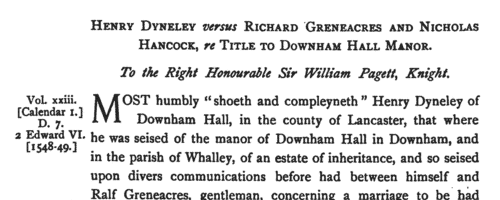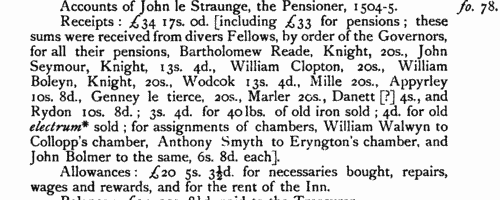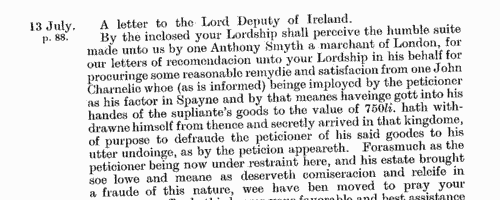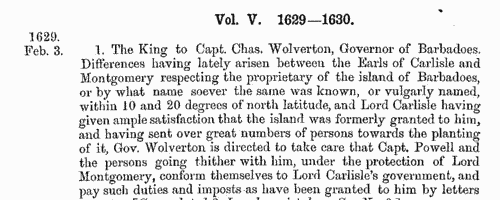Add this eBook to your basket to receive access to all 140 records. Our indexes include entries for the spelling huddlestone. In the period you have requested, we have the following 140 records (displaying 1 to 10): These sample scans are from the original record. You will get scans of the full pages or articles where the surname you searched for has been found. Your web browser may prevent the sample windows from opening; in this case please change your browser settings to allow pop-up windows from this site. Chancery Warrants
(1244-1326)
Warrants were issued by the kings of England to the royal chancery: most of these warrants led to further proceedings which are recorded on the Charter Rolls, Patent Rolls, Fine Rolls, Close Rolls or the Inquisitions: but archivists have identified a large number of warrants for which there are no such equivalent records, and those for the reigns of Edward I and Edward II are gathered here. Most of the entries relate to England and Wales, but with occasional items referring to Ireland and the English possessions in France. | Sample scan, click to enlarge

| Inhabitants of Lancashire
(1547-1558)
Pleadings and depositions in the Duchy Court of Lancaster from the 1st year of Edward VI to the 5th and 6th of Philip and Mary were edited by lieutenant-colonel Henry Fishwick for the Lancashire and Cheshire Record Society and published in 1899. The records include some long and detailed depositions about the precise facts of the cases: whereas plaintiffs and defendants were by and large from the landed gentry, deponents were often of much humbler stations in life, people who otherwise hardly appear in surviving records. | Sample scan, click to enlarge

| Lawyers and officers of Lincoln's Inn
(1422-1586)
Lincoln's Inn is one of the ancient inns of court in London exclusively invested with the right to call lawyers to the English bar. The Black Books of Lincoln's Inn are the main administrative records of the society, containing the names of those filling the different offices year by year; the annual accounts of the Pensioner and the Treasurer; regulations; punishments and fines for misdemeanours. This edition, printed for the Inn in 1897, covers the first five surviving volumes. | Sample scan, click to enlarge

| The English in Holland and Flanders
(1586-1587)
The State Papers Foreign of queen Elizabeth consist mainly of letters and reports concerning England's relations with continental Europe. The inhabitants of the Low Countries were at this period attempting to throw off the Spanish yoke, and Elizabeth sent considerable forces to their aid: the English leader, Robert Dudley earl of Leicester, was offered the governorship of the States General. The papers relating to Holland and Flanders in the State Papers Foreign are so voluminous in consequence, that a separate calendar was edited by Sophie Crawford Lomas and Allen B. Hinds under the direction of the Master of the Rolls, this volume, covering June 1586 to March 1587, being published in 1927. | Sample scan, click to enlarge

| Liegemen and Traitors, Pirates and Spies
(1592)
The Privy Council of queen Elizabeth was responsible for internal security in England and Wales, and dealt with all manner of special and urgent matters
| Sample scan, click to enlarge

| Middlesex Sessions
(1549-1603)
This printed calendar collates a number of surviving records from Middlesex sessions for the period. Principally these are the Gaol Delivery Rolls (G. D. R.) and the General Sessions of the Peace Rolls (G. S. O. P. R.). Both series cover general criminal indictments (bills) together with the recognizances of the witnesses to attend; but the Gaol Delivery Rolls, by their very nature, tend to deal with the more serious cases - felonies where the accused could not be released on bail. The General Sessions rolls also include the sheriff's lists of bailiffs, sub-bailiffs, high and petty constables in the shire; writs of venire facias for production of jurors, writs of capias, lists of jurors, jury-panels &c. The Gaol Delivery Rolls also include coroners' inquests, writs of supersedeas, and memoranda of proclamations. Special inquiries are recorded in separate Sessions of Oyer and Terminer (S. O. T.) rolls and Inquest or Inquisition rolls (I. R.) Although coverage is good, none of the sequences of rolls for this period is complete. A peculiarity of this calendar is that in the case of actual incidents, the date given at the start of each entry is the date that the incident was alleged to have taken place (for instance, 1 June 11 Elizabeth (1569) in the sample scan) rather than the date of the court proceedings. | Sample scan, click to enlarge

| Liegemen and Traitors, Pirates and Spies
(1616-1617)
The Privy Council of James I was responsible for internal security in England and Wales, and dealt with all manner of special and urgent matters
| Sample scan, click to enlarge

| Colonists and adventurers
(1610-1660)
During this period, the English crown issued charters to companies of adventurers and individual proprietors to establish settlements in Acadia (Nova Scotia), Africa, Amazon, Anguilla, Antigua, Association (Tortuga), Bahamas, Barbadoes, Barbuda, Bermudas (Somers Islands), Canada, Cape Gratia de Dios, Carolina, Bay of Darien, Delaware Bay, Deseada, Dominica, Eleuthera, Enegada, Fernando de Noronho, Floria, Fonseca, Grenada, Guadaloupe, Guiana, Guinea, Henrietta, Jamaica, Long Island, Maine, Marigalante, Maryland, Metalina, Montserrat, Narrangansetts Bay, Nevis, New England (New Plymouth, Massachusetts, Connecticut and New Haven), Newfoundland, New Hampshire, New York, Nova Scotia, Providence Island, Quebec, Redendo, Rhode Island, St Bartholomew, St Brandon, St Christopher's, St Eustache, St Lucia, St Martin, St Vincent, Sembrera, Surinam, Tadousac, Tobago, Todosantes, Trinidad and Virginia. The central archive relating to these ventures up to 1688 amounted to 71 volumes of correspondence, plus 109 entry books containing entries of letters sent to the colonies, of charters, commissions and instructions, minutes and proceedings of the companies and proprietaries that in the first instance governed several of the colonies, journals of the Board of Trade, &c. This archive, called the State Papers, Colonial Series, at the Public Record Office, was calendared for the period through to 1660 by W. Noel Sainsbury, and published in 1860. The first few pages include material as early as 1574, but the bulk of the volume is from 1610 to 1660, and that is indexed here. | Sample scan, click to enlarge

| St Albans Archdeaconry Marriage Licences: Sureties
(1667)
Southern Hertfordshire lay in the archdeaconry of St Albans. Marriage licences registered in the archdeaconry act books from 1584 to 1639, and surviving bonds and allegations from 1611 to 1620, 1625 to 1627, 1633 to 1637 and 1661 to 1668 were abstracted by A. E. Gibbs and printed in volume 1 of the Herts Genealogist and Antiquary published in 1895. Both the act books and the bonds normally give full name and parish of bride and groom, and state whether the bride was maiden or widow. A widow's previous married surname is given, not her maiden surname. Occasionally (doubtless when a party was under age) a father's name is given. The later act books sometimes stated at what church the wedding was intended to be celebrated. The marriage bonds give the name of the bondsman or surety. The surety's surname is often the same as the bride or groom, and doubtless in most cases the bondsman was a father or close relative; but a few innkeepers and other tradesmen of St Albans also undertook this duty. | Sample scan, click to enlarge

| Allegations for marriages in southern England
(1660-1669)
The province or archbishopric of Canterbury covered all England and Wales except for the northern counties in the four dioceses of the archbishopric of York (York, Durham, Chester and Carlisle). Marriage licences were generally issued by the local dioceses, but above them was the jurisdiction of the archbishop, exercised through his vicar-general. Where the prospective bride and groom were from different dioceses it would be expected that they obtain a licence from the archbishop; in practice, the archbishop residing at Lambeth, and the actual offices of the province being in London, which was itself split into myriad ecclesiastical jurisdictions, and spilled into adjoining dioceses, this facility was particularly resorted to by couples from London and the home counties, although there are quite a few entries referring to parties from further afield. The abstracts of the allegations given here usually state name, address (street in London, or parish), age, and condition of bride and groom; and sometimes the name, address and occupation of the friend or relative filing the allegation. Where parental consent was necessary, a mother's or father's name may be given. The ages shown should be treated with caution; ages above 21 tended to be reduced, doubtless for cosmetic reasons; ages under 21 tended to be increased, particularly to avoid requiring parental consent; a simple statement 'aged 21' may merely mean 'of full age' and indicate any age from 21 upwards. These are merely allegations to obtain licences; although nearly all will have resulted in the issuing of the licence, many licences did not then result in marriage. | Sample scan, click to enlarge

|
Research your ancestry, family history, genealogy and one-name study by direct access to original records and archives indexed by surname.
|











